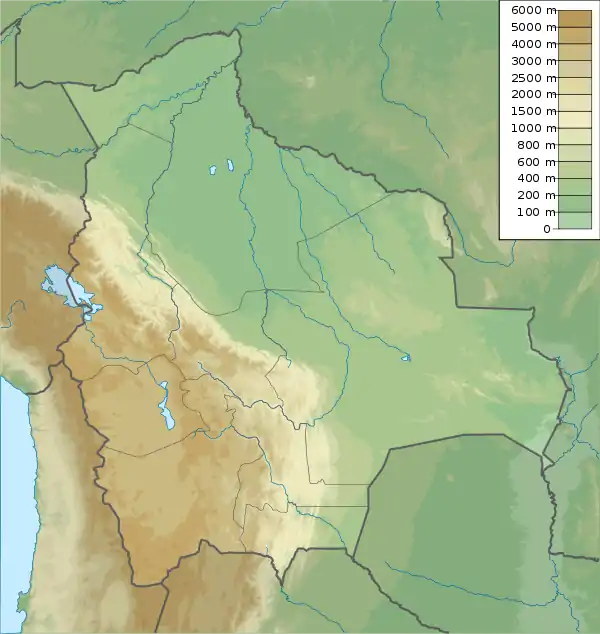Sella Formation
The Sella Formation is a Dapingian to Darriwilian geologic formation of southern Bolivia. The grey to green bioturbated siltstones interbedded with thin sandstone layers bear lenticular shell beds. Other parts of the formation contain yellow-green limy shales and grey sandy limestones. Coquinas often fill gutter casts and included brachiopods, trilobites, bivalves and nautiloids. The sediments were deposited in an open marine environment.[1][2][3][4][5] The species Coxiconchia sellaensis was named after the formation.
| Sella Formation Stratigraphic range: Dapingian-Darriwilian ~478–450 Ma | |
|---|---|
| Type | Geological formation |
| Lithology | |
| Primary | Siltstone, sandstone |
| Other | Shale, limestone, coquina |
| Location | |
| Coordinates | 21.4°S 64.6°W |
| Approximate paleocoordinates | 42.8°S 131.6°W |
| Region | Tarija Department |
| Country | |
 Sella Formation (Bolivia) | |
Fossil content
The formation has provided the following fossils:
- Baltograptus minutus[6]
- Coxiconchia sellaensis
- Desmorthis segnis
- Glyptorthis imbrex
- Hemiprionodonta lusitanica
- Lingulocystis boliviensis
- Natasia boliviensis
- Pliomeridius sulcatus
- Redonia riojana
- Ribeiria spinosa
- Peelerophon cf. oehlerti
- Ampyx sp.
- Boeckaspis sp.
- Branisaspis sp.
- Bucania sp.
- Colpocoryphe sp.
- Cosmogoniophorina sp.
- Ctenodonta sp.
- Cyptendoceras sp.
- Didymograptus sp.
- Endoceras sp.
- Eothinoceras sp.
- Famatinolithus sp.
- Haploprimitia sp.
- Hoekaspis sp.
- Lecanospira sp.
- Lonchodomas sp.
- Maclurites sp.
- Quadrilobella sp.
- Parapyxion sp.
- Protocycloceras sp.
- Sibiritella sp.
- Suriaspis sp.
- Synhomalonotus sp.
- Technophorus sp.
- Trinucleus sp.
References
- Sella C at Fossilworks.org
- Pantipampa, 3 kilometers east of Belle Vista at Fossilworks.org
- Sella, Bed 1 at Fossilworks.org
- Sella at Fossilworks.org
- Sella Bed 4 at Fossilworks.org
- Suárez Riglos et al., 2018, p.64
Bibliography
- Suárez Riglos, Mario; Alejandra Dalenz Farjat, and Miguel Ángel Pérez Leyton. 2018. Fósiles y Facies de Bolivia, 1–146. Sincronía Diseño & Publicidad, Santa Cruz de la Sierra. Accessed 2019-03-03.ISBN 978-99974-79-68-6
Further reading
- C. Babin and L. Branisa. 1987. Ribeiria, Peelrophon y otros molluscos del Ordovícico de Bolivia. 4˚ Congreso Latinoamericano de Paleontología 1:119-129
- L. Branisa. 1965. Los fosiles guias de Bolivia: I. Paleozoico. Boletin de Servicio Geologico de Bolivia. La Paz, Bolivia 6:1-282
- V. Havlicek and L. Branisa. 1980. Ordovician brachiopods of Bolivia: Succession of assemblages, climate control, affinity to Anglo-French and Bohemian provinces. Rozpravy Ceskoslovenske Akademie Ved. Rada Matematickych a Prirodnich Ved. Academia Praha, Prague, Czechoslovakia 90(1):1-54
- T. M. Sánchez and C. Babin. 2005. Lower Ordovician bivalves from southern Bolivia: paleobiogeographic affinities. Ameghiniana 42(3):559-566
- R. Suárez Soruco. 1976. El sistema ordovícico en Bolivia. Revista Tecnica YPF Bolivia 5(2):111-123
This article is issued from Wikipedia. The text is licensed under Creative Commons - Attribution - Sharealike. Additional terms may apply for the media files.